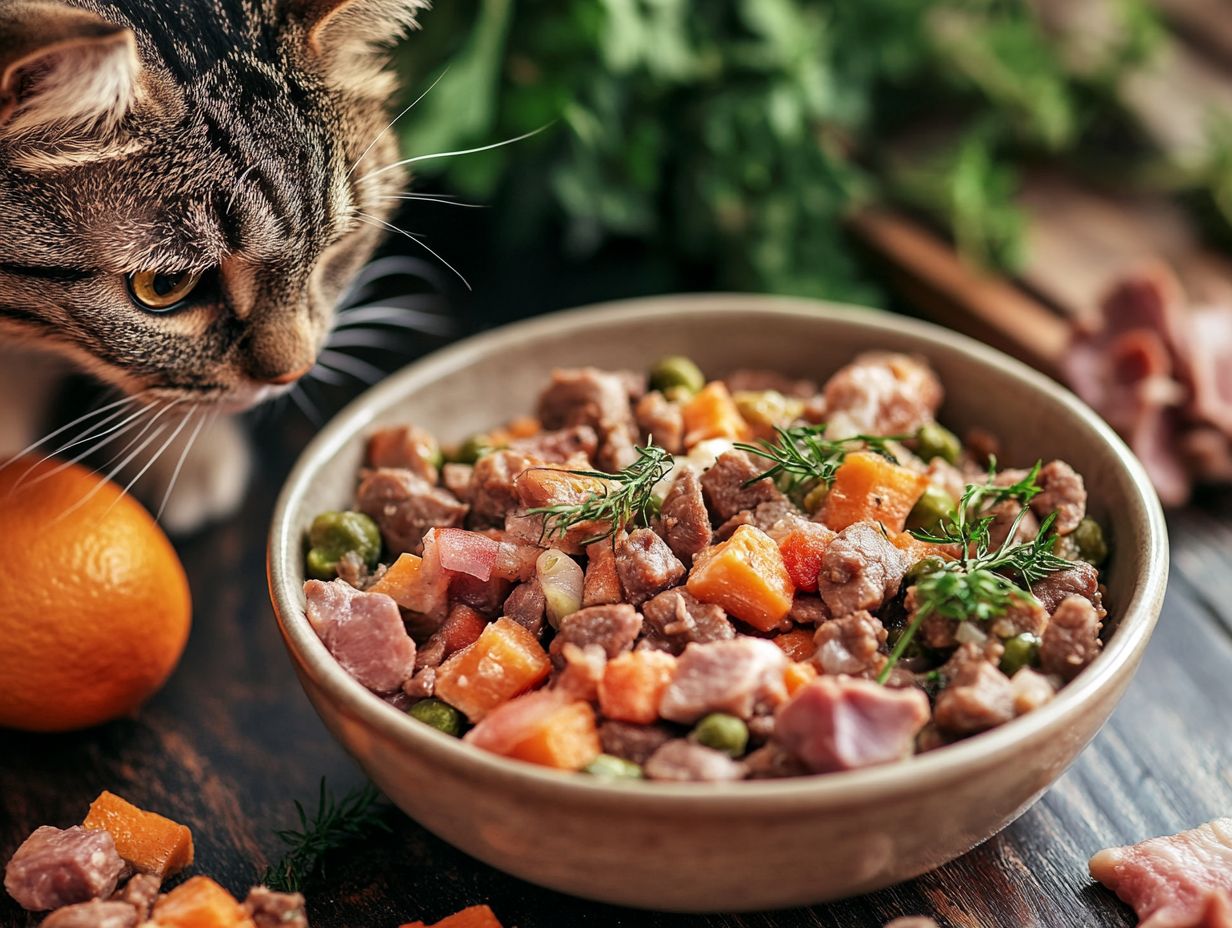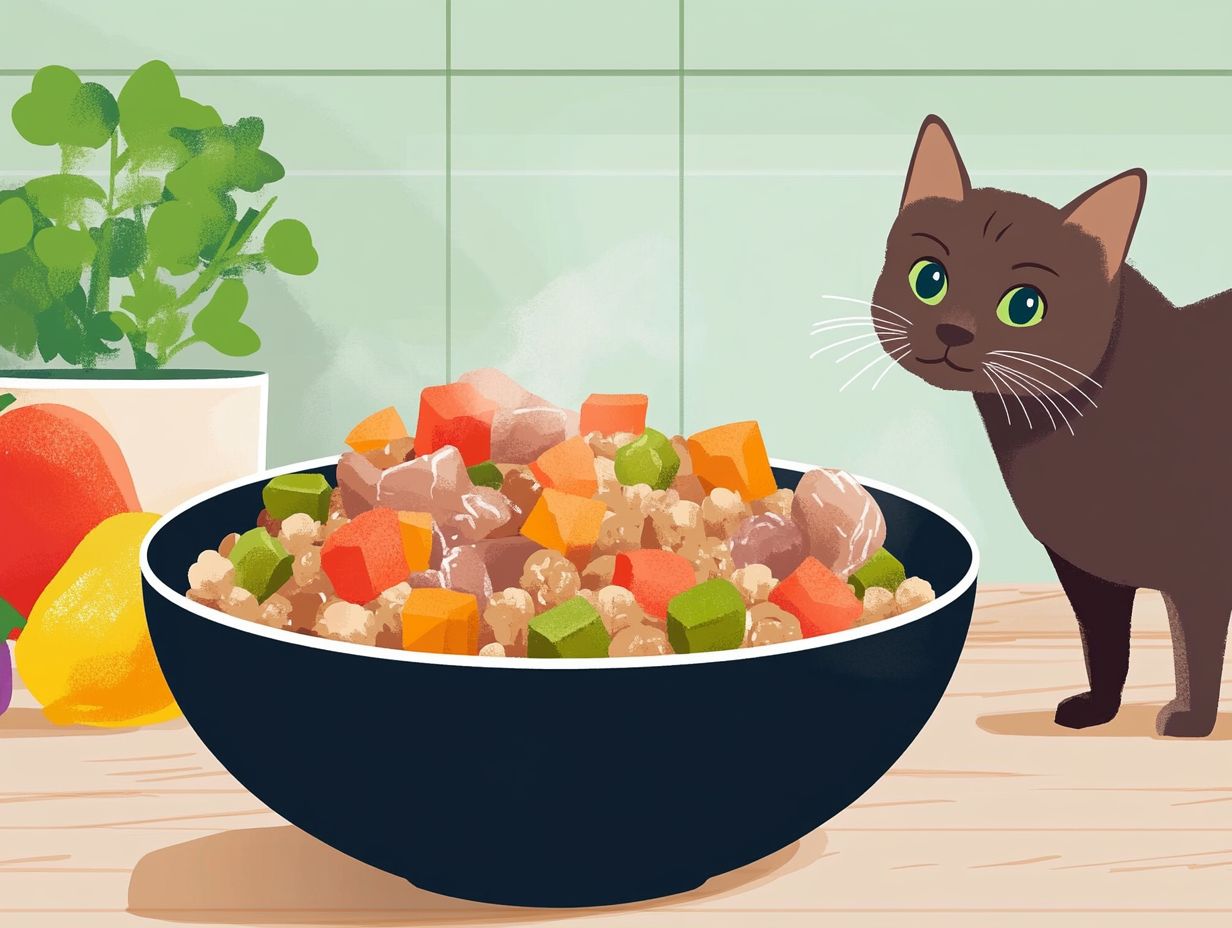Disclaimer: Before making significant dietary changes for your cat, especially if they have specific health conditions, consult with your veterinarian. Homemade diets can pose risks if not balanced correctly; always seek veterinary guidance.
Understanding Cat Nutrition: The Importance of Natural Ingredients for Your Feline’s Health
When it comes to our feline friends, nutrition plays a crucial role in their health and well-being.
With the rise of commercially prepared cat food with natural ingredients, pet owners are increasingly seeking knowledge about what goes into their cat’s diet.
This article explores the essence of commercially prepared cat food with natural ingredients, highlighting the importance of quality ingredients and the benefits they bring, from improved digestion to increased energy.
We will also discuss the risks associated with non-natural options and provide tips on selecting the best food for your furry companion.
Dive in to discover how to keep your cat thriving and vibrant!
Key Takeaways:

What Is Commercially Prepared Cat Food with Natural Ingredients?
Commercially prepared cat food with natural ingredients is specifically formulated to meet the dietary needs of cats and supports their nutrition. It includes animal-source proteins, omega fatty acids, and essential amino acids that promote overall cat health, in alignment with AAFCO guidelines.
Unlike conventional cat food, this type of cat food is free from artificial additives, grain fillers, and animal by-products. It emphasizes a balanced diet that supports proper nutrition.
Ingredients such as chicken, beef, turkey, and salmon provide crucial protein sources that cats require while ensuring a richer taste that appeals to their palates. Additionally, natural blends contain taurine, an essential nutrient that helps prevent taurine deficiency in cats’ diets, making these diets vital for your pet’s health.
Why Are Ingredients Important In Cat Food?
Ingredients play a crucial role in cat food as they directly impact the quality of a cat’s nutrition, which can lead to health issues and overall well-being. The quality and type of ingredients influence a cat’s dietary balance, affecting their intake of protein, essential fatty acids, and key vitamins and minerals.
Manufacturers that adhere to the standards set by the Association of American Feed Control Officials (AAFCO) ensure that their ingredients meet the nutritional requirements for a traditional feline diet. Therefore, seeking veterinary guidance in food selection is essential for cat owners, especially when dealing with cat food allergies.
What Are the Essential Ingredients for a Healthy Cat Diet?
A healthy cat diet should include core ingredients such as animal-source proteins, fats, carbohydrates, fiber, vitamins, and minerals that fulfill the specific nutritional needs of cats, ensuring proper dietary balance.
What Are the Benefits of Commercially Prepared Cat Food with Natural Ingredients?
Commercially prepared cat food with natural ingredients offers several benefits, including better overall nutrition, a reduced risk of food allergies, improved digestion, healthier skin and coat, and enhanced energy and vitality.
Risks and Benefits of Various Diet Types
It’s important to consider the risks and benefits of various diet types, including raw, vegan, and homemade diets. Cats are obligate carnivores, requiring animal-source proteins for their nutritional needs. While raw diets may provide certain benefits, they can also pose risks related to bacterial contamination and nutrient imbalances.
Weight Management and Dietary Guidelines
For managing weight, cat owners should align their feeding practices with current obesity guidelines for felines, which include recommendations for calorie intake based on life stages such as kittens, adults, and seniors.
Common Allergens and Toxic Ingredients
Be aware of potential allergens and toxic ingredients commonly found in cat food, such as onions and garlic, which can be harmful to cats.
Food Storage and Handling
Proper food storage is essential for maintaining cat food’s quality. Store food in a cool, dry place, and always check for spoilage signs, such as off smells or changes in texture.
Special Dietary Needs
Some cats have special dietary needs due to health conditions like kidney disease and diabetes. It is important to consult with a veterinarian to determine the appropriate nutrient profiles and the necessity of prescription diets.
1. Better Overall Nutrition
The primary advantage of high-quality, animal-based cat food is its superior overall nutrition compared to conventional options, largely due to its higher protein and nutritional quality as per AAFCO standards. Brands like Royal Canin offer natural cat food that contains a significant proportion of animal proteins while avoiding low-quality fillers, ensuring that each meal provides the essential nutrition cats need to stay healthy.
2. Fewer Allergies and Sensitivities
Natural cat food can help reduce allergies and sensitivities in cats due to its focus on wholesome, minimally processed ingredients and limited ingredient diets. These natural diets avoid common allergens, including artificial additives and grain fillers, thereby enhancing digestion and overall health.
3. Improved Digestion
Improved digestion is a significant benefit of high-quality, animal-based cat food, thanks to its high-quality ingredients and appropriate fiber content, which work together to support optimal gut health and nutrient absorption.
4. Healthier Skin and Coat
Natural cat food promotes healthier skin and coat by incorporating essential fatty acids and high-quality protein sources that nourish and protect a cat’s skin. Ingredients high in omega fatty acids, such as fish oils, are vital for maintaining coat luster and reducing dryness.
5. Considerations for Different Life Stages
When feeding your cat, keep in mind that different life stages, such as kittens, senior cats, and pregnant or nursing cats, have unique nutritional needs. Consult with a veterinarian to tailor your cat’s diet to their specific life stage for optimal health.
6. Food Storage and Handling
Proper food storage and handling are crucial to preventing spoilage and maintaining the safety and health of your cat’s food. Store dry food in a cool, dry place and ensure that wet food is refrigerated after opening. Always check expiration dates and discard any expired food to avoid potential health risks.
How to Choose the Best Natural Cat Food for Your Pet?
To select the best natural cat food, review the ingredients list, avoid artificial preservatives and additives, and consider your cat’s specific needs, including moisture content, animal proteins, and dietary balance.
1. Read the Ingredients List
The ingredient list is crucial when selecting natural cat food. Natural cat food is made with high-quality ingredients that are minimally processed and free from artificial additives. The ingredient list reflects the quality of the ingredients used and the nutritional benefits they provide.
2. Avoid Artificial Preservatives and Additives
Natural cat food brands should avoid artificial preservatives and additives, as these chemicals can pose health risks to felines and diminish the overall nutritional value of the food.
3. Consider Your Cat’s Specific Needs
When selecting cat food, consider your cat’s specific needs. Factors such as activity levels, breed preferences, and existing health conditions should all be taken into account. Consulting with your veterinarian can help identify any food allergies or dietary restrictions.
4. Consult with Your Veterinarian
Involving your veterinarian in the decision-making process regarding the best cat food is crucial, as they can provide tailored health advice based on your cat’s individual dietary needs and health status. Their expertise in identifying the best natural cat food options that meet AAFCO standards is invaluable.
Frequently Asked Questions

What is natural cat food?
Natural cat food is defined as made with minimally processed ingredients, free from artificial additives and by-products, providing a nutritious diet for cats.
Why is natural cat food beneficial?
Natural cat food is beneficial because it provides a diet that closely resembles what they would eat in the wild, free from artificial ingredients.
How do natural cat food ingredients differ from regular cat food?
Natural cat food ingredients are minimally processed and do not contain artificial additives, fillers, or by-products, providing a more nutritious diet.
What are some common ingredients found in natural cat food?
Common ingredients found in natural cat food include real meat sources, fruits, and vegetables, as well as beneficial supplements like probiotics.
Can natural cat food benefit cats with food sensitivities?
Yes, it can benefit cats with food sensitivities as it is free from common allergens that can trigger sensitivities.
Are there any downsides to feeding my cat natural cat food?
Some natural cat foods may lack essential nutrients. It’s crucial to consult with your veterinarian to ensure a balanced diet.
How do I choose natural cat food for different life stages?
When selecting natural cat food, consider your cat’s life stage, as their dietary requirements vary significantly. Consulting with your veterinarian can provide guidance.
What are the best storage and handling practices for natural cat food?
Store natural cat food in a cool, dry place and seal it properly after each use. Check for spoilage before feeding your cat.
Can natural cat food help with specific health conditions?
Yes, work closely with your veterinarian to choose the right natural food that aligns with your cat’s health needs.
Should I consult my veterinarian about controversial diets?
Consulting with a veterinarian for balanced insights on controversial diets is essential to ensure dietary changes are safe and effective.